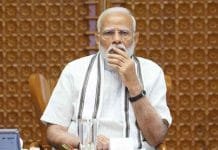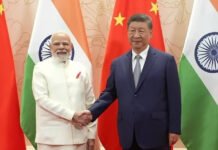In a powerful and unprecedented statement just days before his 90th birthday, His Holiness the 14th Dalai Lama, Tenzin Gyatso, affirmed that the authority to choose his successor rests solely within the Tibetan Buddhist tradition. Rejecting China’s repeated claims of involvement, he made it crystal clear: Beijing will have no role in the selection of the 15th Dalai Lama.
Gaden Phodrang Trust to Lead the Selection Process
Speaking at the Tibetan Religious Conference in Dharamshala, the Dalai Lama confirmed that the Gaden Phodrang Trust, his spiritual and administrative institution, will be solely responsible for recognizing the next Dalai Lama. This process will adhere strictly to six centuries of Buddhist spiritual practice.
“Only the Gaden Phodrang Trust holds the legitimate spiritual authority to determine my reincarnation,” he stated firmly.
The Dalai Lama added that consultations with the heads of the major Tibetan Buddhist schools and trusted Dharma protectors will guide the selection. These sacred traditions of recognition, prayers, and signs will form the spiritual roadmap to find his true successor.
Dalai Lama Affirms Continuation of His Institution
Responding to global appeals from Tibetans and the Buddhist diaspora, the Dalai Lama made an historic announcement:
“The institution of the Dalai Lama will continue,” he declared.
This clears long-standing doubts about whether he would break the line of succession after his passing. His statement reinforces his commitment to Tibetan autonomy, spiritual legacy, and resistance against Chinese interference.
Successor Must Be Born Outside of China
The Dalai Lama was explicit in his declaration: his reincarnation must not be born in China.
“Any child proclaimed by Beijing as my successor should be rejected by the Tibetan people and the global Buddhist community,” he warned.
This statement stands as a direct rejection of China’s attempts to impose its authority on Tibetan Buddhism and manipulate religious traditions for geopolitical gain.
China’s Aggressive Response: A New Flashpoint
In immediate retaliation, China’s Foreign Ministry spokesperson Mao Ning insisted that the next Dalai Lama must be approved via the “Golden Urn” process, a controversial ritual introduced by the Qing dynasty and now manipulated by the Communist Party.
Beijing asserts that religious succession in Tibet must follow Chinese laws and receive governmental endorsement, a claim starkly opposed to Buddhist traditions.
A Historic Conflict Reignited
This confrontation is far from new. In 1959, the 14th Dalai Lama fled Tibet after a failed uprising against Chinese rule. Ever since, he has lived in exile in McLeodganj, Dharamshala, India, turning the Himalayan town into a spiritual and political headquarters for the Tibetan Government-in-Exile.
For decades, China has labeled the Dalai Lama as a separatist and his growing international stature as a threat to Chinese control over Tibet.
How Is the Dalai Lama Chosen?
According to ancient Tibetan tradition, the Dalai Lama is the reincarnation of Avalokiteshvara, the Bodhisattva of Compassion. Upon the death of a Dalai Lama, high lamas and spiritual advisors embark on a meticulous search for a child who displays signs of being the reincarnated soul.
The 14th Dalai Lama was born as Lhamo Thondup on July 6, 1935, in present-day Qinghai, formerly part of greater Tibet. He was recognized as the reincarnation at just two years old, through a spiritual search that included prophetic visions, rituals, and signs.
This sacred practice, passed through generations, is now being contested by China for political control and cultural domination.
U.S. Calls on China to Cease Interference
The United States has reaffirmed its stance, urging China to respect religious freedom and end political interference in Tibetan Buddhism.
“China should not dictate spiritual traditions or interfere in reincarnation processes of Tibetan Buddhism,” said a spokesperson from the U.S. State Department.
This statement aligns with previous bipartisan Congressional resolutions supporting Tibetan autonomy and condemning China’s manipulation of religion.
Penpa Tsering: Tibet Will Reject China’s Chosen Successor
Tibet’s elected political leader, Sikyong Penpa Tsering, issued a defiant response, stating:
“The Tibetan people will never accept a successor chosen by China for political reasons.”
He emphasized that China’s attempts to erase Tibetan identity through language, education, and religious suppression will not be tolerated.
Tibet’s Spiritual Future Rests with the People
The Dalai Lama’s firm declaration sends a resounding message: Tibetan Buddhism will not surrender its spiritual traditions to the Chinese state. With the support of millions of Buddhists worldwide, his words carry deep moral and spiritual weight.
The 14th Dalai Lama’s 90th birthday celebrations in McLeodganj are not just a tribute to his long life but also a reaffirmation of the Tibetan struggle, a spiritual defiance against occupation, and a profound commitment to self-determination.
Key Takeaways: Buddhist Faith vs. Political Power
Only the Gaden Phodrang Trust has the authority to choose the next Dalai Lama.
China will have no role in the identification or approval of the successor.
The Dalai Lama’s successor must be born outside China, selected through sacred tradition.
China insists on the Golden Urn ritual and government approval, sparking global concern.
The U.S. and Tibetan leadership have stood firmly against China’s interference.
What Lies Ahead
The statement by the Dalai Lama may well define the future of Tibetan resistance, identity, and global Buddhist leadership. With tensions rising, the coming years will likely witness a diplomatic, spiritual, and cultural standoff over the next Dalai Lama.
The eyes of the world now turn to the Himalayan monastery halls and prayer flags fluttering across Lhasa and Dharamshala—not just for spiritual wisdom, but for an unfolding chapter in the long battle between faith and authoritarian control.
















